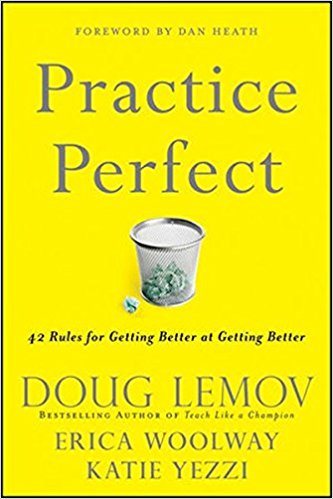On the road to finding the most effective teacher practices in America, the authors of this new book discovered something about most people’s jobs: Practice, especially the right type of practice, can vastly improve performance. Yet few of us ever do it.
In Practice Perfect authors Doug Lemov, Erica Woolway and Katie Yezzishow show us how we can get better at anything by engineering how we practice. Their work in this book stems from years of studying teachers—across Uncommon Schools and beyond—who use practice to improve their delivery of instruction much the same way the best athletes use it to deliver wins on the playing field. The power of these teachers’ practice has resulted in huge gains for low-income students—in many cases wiping out the achievement gap between affluent and low-income students that stymies so many urban school systems across the country.
Building on and refining the work of developing great teachers, Practice Perfect goes beyond the classroom and breaks down practice in multiple settings. It shows you the most effective ways to incorporate practice in nearly any field, just as Lemov’s previous book Teach Like a Champion (over 500,000 copies sold) showed how any teacher can dramatically improve her game by implementing certain effective techniques.
But just practicing isn’t enough. By researching the latest in brain and behavioral science, the authors found that how you practice matters as much if not more than how much you practice. Practicing the wrong way can solidify poor performance. Practicing the right way involves breaking through assumptions, modeling excellent practice, using feedback, creating a culture of practice, making new skills stick and hiring for practice.
“There’s a long list of skills we’d all be wise to hone: How to run a meeting that doesn’t drag on. How to listen (really listen) to your spouse. How to get through a stressful commute without barking out profanities,” writes Dan Heath, senior fellow at Duke University’s CASE center and co-author of Made to Stick and Switch, in the book’s foreword. “The enemies of practice are pride and fear and self-satisfaction. To practice requires humility. It forces us to admit that we don’t know everything… To practice isn’t to declare, ‘I’m bad.’ To practice is to declare, ‘I can be better.’”
Packed with stories of practice masters like Coach John Wooden, surgeon Atul Gawande, and basketball star Michael Jordan, Practice Perfect breaks down effective practice into 42 clear rules. They include:
- Encode Success: Engineer your practice activities so the right actions are encoded in your mental circuitry to become habit.
Practice the 20: 80% of your success will come from 20% of your behaviors so practice the most impactful 20% to accomplish your goal. - Isolate the Skill: Identify and name each technique you’ve identified as an important building block for peak performance.
- Call Your Shots: Before you model, tell those for whom you are modeling what to look for.
- Unlock Creativity… with Repetition: You can’t do higher level work if you are wasting brain power on the basics. Drill the fundamentals to free your mind to be creative when it matters most.
By putting together and applying these, and scores of other practice rules from Practice Perfect, anyone can see big changes in their performance. If you are a manager, educator, leader, parent, or coach, you’ll learn how to help others practice effectively to get results. If you’re looking to achieve your own personal goals and break through to another level, you’ll learn how practice can get you there.

